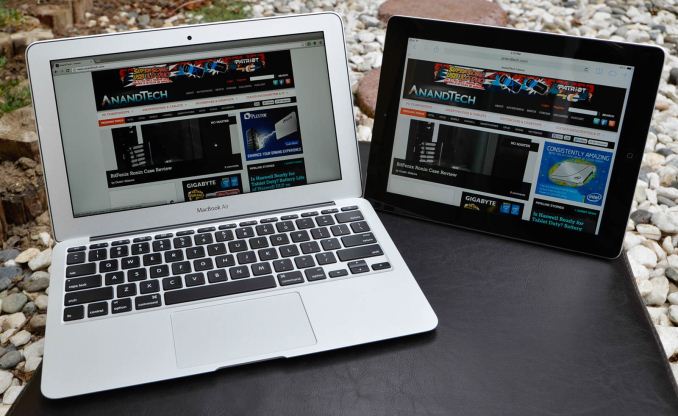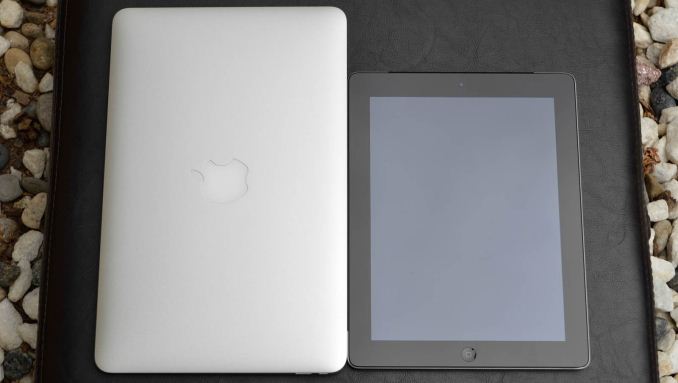The 2013 MacBook Air Review (11-inch)
by Vivek Gowri on August 9, 2013 1:45 AM ESTSince the last time the iPad versus MacBook Air 11” comparison was brought up, both products have improved and evolved tremendously, the iPad more so than the Air. It’s easy to dismiss even making the connection (because who here actually cross-shops a high-end ARM tablet with a mid-range ultraportable, raise of hands please) but I think there are enough shared attributes to make a discussion worthwhile, especially considering the similarity in terms of form factor and now battery life. If I was looking for an extremely compact, thin, light, and long-lasting companion device to bring on a trip, they’re both completely valid answers. But which would I actually take?
The short answer would almost always be the Air, for a variety of reasons, but I’ll get there. This basically goes back to the tablet versus notebook conversation for various usecases. The iPad is awesome as a travel device, as are most tablets in general, and you can see evidence of this in any airport terminal. Especially after the screen upgrade last year, the iPad is hands down one of the best content consumption devices on the market. It’s also my absolute favorite digital platform for reading. I’ll actually save lengthy articles, like some AnandTech reviews and other long-form content from other websites I enjoy, to read on my iPad. Between the sharpness of text on the Retina display and the physical closeness you have with the words, it’s about the closest you can get to a paper reading experience on an LCD. (This also holds true for any high-DPI tablet, including the Nexus 7.2, Nexus 10, Surface Pro, and others). Also, the ability to use a tablet with only one hand, not needing a platform of some kind, and general versatility of physical handling adds a convenience factor that’s hard to get from a notebook.
But when the tablet doesn’t have an inherent advantage in terms of size or battery life, it’s a lot harder to justify skipping the sheer versatility and power you get out of a real notebook computer, even a small one, for reasons that amount to the tablet being easier to use while standing up. The notebook is basically better at everything other than reading, and there’s far more computing horsepower at your disposal. You have far more control over everything that happens—media, browsing, documents, you name it. And there’s a real, physical keyboard, so in terms of productivity, there’s just not a conversation. To some degree, that’s always been something that held tablets back for me and I suspect the other editors on staff. Admittedly, our usecases typically involve a lot of writing and email, neither of which is easy at all without a hardware keyboard, so we’re probably not the right target demographic to judge tablets by.
The capabilities of a Core i5-based ultraportable are so far beyond that of an iPad or Nexus 10 though, which is part of what makes this on the surface a somewhat odd comparison to be making. Obviously the tablets are cheaper, though it’s worth pointing out that a 128GB iPad (WiFi) is only $200 less than a 128GB Air 11”, and as noted earlier the iPad keyboards typically run $100. I don’t know why anyone would need that much storage on an iPad, maybe if you had a ton of 1080p video content that you really needed to carry with you everywhere. The 16 and 32GB iPads, at $499 and 599, are obviously far more accessible and probably more sensible investments.
I’m not trying to recommend that people buy the Air over the iPad, just that it’s possible to do so with very little compromise. It wasn’t really something you could do until now simply because of battery life, but with Haswell ULT boasting similar or better power efficiency than high-end ARM SoCs in light everyday CPU-driven workloads, it’s certainly something to think about. I think the best of both worlds situation is yet to come, possibly with something that looks like a thinner, Haswell-based Surface Pro with Windows 8.1 and significantly better battery life than we’ve seen out of Ivy Bridge tablets in the last year.












139 Comments
View All Comments
repoman27 - Friday, August 9, 2013 - link
For some reason Apple is still using Cactus Ridge DSL3510L 4C controllers in the 2013 Airs.Technically the configuration could drive any 4K display on the market just fine, even with only a single port exposed. The problem is the lack of daisy-chainable Thunderbolt devices with dedicated DisplayPort / HDMI 1.4 / dual-link DVI ports.
Theoretically, you could build a device in the $80 retail range with two Thunderbolt controllers and two DP ports just to drive 4K displays.
Darkfire - Friday, August 9, 2013 - link
I'm impressed with the listed 7 hours of battery life on the Macbook Pro (Early 2011). I have gfxCardStatus and keep it forced on integrated most of the time, and usually get around 5 and a half.darwinosx - Friday, August 9, 2013 - link
Why does Vivek do Apple anything reviews? He makes many mistakes while progressing to prefer Windows. Leave the Mac reviews to Anand who knows what he is talking about and does not have an anti-Apple bias.Also how is their no performance improvement when the sad is twice as fast and destroys anything else on the market? You know the SSD's that you didn't event set or show stats for? Ridiculous.
KPOM - Friday, August 9, 2013 - link
Since the 11" and 13" MacBook Air models have the same processors this year, (both in base and upgrade form), apart from the impact of thermals the performance should be pretty similar. I think a separate review from someone else is warranted. As for pro- or anti-Apple bias, let's face it. While Apple legitimized and mainstreamed the ultraportable category (which was largely restricted until 2010 to an ultra-expensive and underpowered niche), most people use Windows. It's good to get some different perspectives.ananduser - Saturday, August 10, 2013 - link
"Mainstreamed" is a stretch; only by virtue of their limited lineup and by positioning ultrabook skus at the low end. I'm saying average macusers aren't rushing for the form factor but for the entry level price. In the Windows world ultrabooks are still a niche because more inexpensive alternatives exist.KPOM - Saturday, August 10, 2013 - link
Regardless of why, the bottom line is that before October 2010, ultraportables (including the earlier MacBook Air) were not very popular and were mostly executive toys. After October 2010, they became popular and as sales of the MacBook Air improved, more manufacturers started making them.The 13" MacBook Pro has outsold the MacBook Air, so I doubt that it was solely price that drove MacBook Air sales. I think people genuinely like the smaller form factor. I've long preferred ultraportables and was an early MacBook Air buyer (February 2008). The only reason I switched was for the Retina Display on the 13" rMBP.
solipsism - Friday, August 9, 2013 - link
1) Maybe they think they are being more "objective" by having someone make such subjective, anti-Apple comments in some of their Apple-released reviews.2) Anand already tackled the new SSD last month, as well as the new 13" MBA.
• http://www.anandtech.com/show/7058/2013-macbook-ai...
• http://www.anandtech.com/show/7085/the-2013-macboo...
VivekGowri - Saturday, August 10, 2013 - link
I'm somehow characterized as an Apple fanboy by the other notebook editors on staff, but I'm glad that you can look past that and make sure someone who's literally owned every Apple product released over the last five years other than the Mac Pro can be called out for hating Macs. That takes a lot of analytical depth and strength of reason.Refresh my memory though, where do I say anything particularly anti-Apple? Or that I prefer Windows? I ask only because OS X has been my primary mobile OS for the better part of the last three years, and if you have insight into my tastes that perhaps I am not aware of, I should heed your advice and move off the platform.
VivekGowri - Saturday, August 10, 2013 - link
Also, Haswell IPC stayed flat relative to IVB. Lowering clock speed naturally means that CPU performance goes down. Deal with it. I mentioned that the SSD helps balance the performance gap in daily usage, but damn if you can use it to claim a typical generational bump in raw compute power. That's not the point of Haswell, but it's still important to recognize the strengths and faults of the platform. Did you actually read the review?nerd1 - Saturday, August 10, 2013 - link
There are lots of mSATA RAID 0 setups among new windowsbooks, and they are a) just as fast b) user expandable c) WAY cheaper than proprietary solution.And I highly doubt MBA can do any serious task that can benefit from faster SSD.